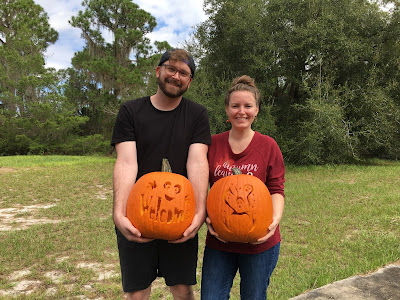I feel like I have a lot of things to say about this book, and where do I even start?
A brief history on how I acquired this book and why I even wanted to read it in the first place?
You know me so well.
Honestly, I couldn't tell you the first time I ever heard of Their Eyes Were Watching God. The title has always been a familiar one to me, and much like
Rebecca by Daphne du Maurier, it kept popping up on those
Must-Read-Before-Death lists I'm so fond of looking over. Incidentally, I bought this book and Rebecca on the same trip to
The Book Shelter back in
the summer of 2018. And as is often the case, it went straight to a cozy spot on my bookshelf and sat there for almost two years before I got around to reading it.
To call Zora Neale Hurston's Their Eyes Were Watching God an "African American feminist classic" may be an accurate statement—it is certainly a frequent statement—but it is a misleadingly narrow and rather dull way to introduce a vibrant and achingly human novel. The syncopated beauty of Hurston's prose, her remarkable gift for comedy, the sheer visceral terror of the book's climax, all transcend any label that critics have tried to put on this remarkable work. First published amid controversy in 1937, then rescued from obscurity four decades later, the novel narrates Janie Crawford's ripening from a vibrant, but voiceless, teenage girl into a woman with her finger on the trigger of her own destiny. Although Hurston wrote the novel in only seven weeks, Their Eyes Were Watching God breathes and bleeds a whole life's worth of urgent experience.
Let me emphasize a few things here. Their Eyes Were Watching God was originally published in 1937. Zora Neale Hurston passed away a little over 22 years later, alone and in complete obscurity, her body being laid to rest in an unmarked grave. Since the resurgence of her work in the 1970s, she is now considered the most successful and most significant black woman writer of the first half of the twentieth century. Over a 30+ year career, she published four novels, two books of folklore, an autobiography, numerous short stories, and several essays, articles, and plays. She was a novelist, folklorist, and anthropologist whose fictional and factual accounts of black heritage remain unparalleled. This woman won multiple Guggenheim Fellowships to gather material for books on authentic Negro folk-life in Haiti and Jamaica. The more I read about her life, the more impressed I am with her. I mean, she wrote Their Eyes Were Watching God—objectively her best work and widely considered one of the best English language novels—in seven weeks!
So how did she end up in such poverty and obscurity? Henry Louis Gates, Jr. attempts to explain:
How could [Zora Neale Hurston] virtually "disappear" from her readership for three full decades? There are no easy answers to this quandary, despite the concerted attempts of scholars to resolve it. It is clear, however, that the loving, diverse, and enthusiastic responses that Hurston's work engenders today were not shared by several of her influential black male contemporaries. The reasons for this are complex and stem largely from what we might think of as their "racial ideologies." Part of Hurston's received heritage—and perhaps the paramount received notion that links the novel of manners in the Harlem Renaissance, the social realism of the thirties, and the cultural nationalism of the Black Arts movement—was the idea that racism had reduced black people to mere ciphers, to beings who only react to an omnipresent racial oppression, whose culture is "deprived" where different, and whose psyches are in the main "pathological." Albert Murray, the writer and social critic, calls this "the Social Science Fiction Monster." Socialists, separatists, and civil rights advocates alike have been devoured by this beast. Hurston thought this idea degrading, its propagation a trap, and railed against it. It was, she said, upheld by "the sobbing school of Negrohood who hold that nature somehow has given them a dirty deal." Unlike Hughes and Wright, Hurston chose deliberately to ignore this "false picture that distorted." Freedom, she wrote in Moses, Man of the Mountain, "was something internal...The man himself must make his own emancipation." And she declared her first novel a manifesto against the "arrogance" of whites assuming that "black lives are only defensive reactions to white actions." Her strategy was not calculated to please.
He goes on to say that Hurston set out to write a black novel, not a treatise on sociology.
And she was successful. I was immediately swept into the romantic narrative of Their Eyes Were Watching God. Hurston's prose is absolutely beautiful and the way she seamlessly weaves the King's English with the phonetic dialect of Eatonville Ebonics was stunning. I believed every word of Janie Crawford's story.
I felt a particular connection with this novel as it is set in my home of Central Florida. I could easily picture the places Janie lived, and I know from firsthand experience what it is to live through some rip-roaring hurricanes. Hurston writes Florida with crystal clear accuracy as she herself lived most of her life in the setting for Their Eyes Were Watching God, her earliest memories in Eatonville itself. She draws from her personal experiences and relationships with seeming ease to great effect throughout this standout novel. Why
this wasn't required reading in my high school instead of
The Adventures of Huckleberry Finn I'll never know. (And that's with absolutely no disrespect to Huck Finn; it's an excellent novel in its own right.)
If you've stuck with me this far (I hope you have) and if it isn't glaringly obvious by now (I hope it is), this is a novel I'd recommend. The story is just so real and tragic and human and good, and the writing is magnificent. While this book did take me a little bit longer to read because of the phonetic dialect used throughout, I could hear the characters in my head, and I felt like I was right there. Definitely would recommend, especially to my fellow Floridians for the historical context. This is a book I hope you'll love.
Have you ever read a good book that was made even better because you were intimately familiar with the setting? Have you ever found yourself doing a deep dive into an author's life after reading their work?
















